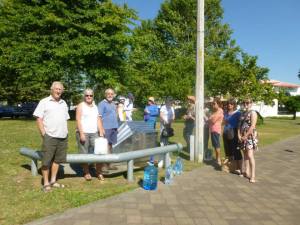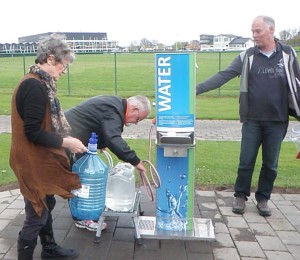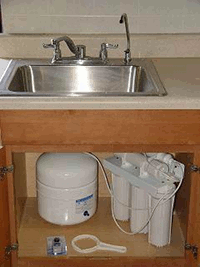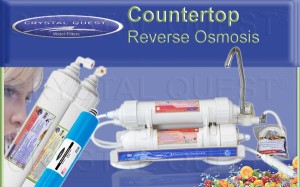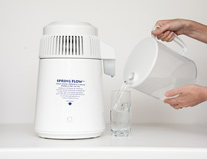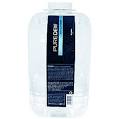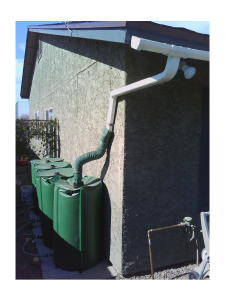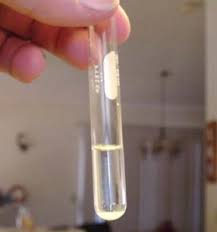Regional Sources of Clean Water
- In Auckland, the only non-fluoridated place is Onehunga but we are unaware of any public tap. There are a number of natural springs in the city.
- Hamilton has two fluoridation-free taps. One in Claudelands and the other in the Taitua Arboretum outlet. See press release by Fluoride Free Hamilton for details.
- Taupo According to the Taupo Council, Acacia Bay has a separate water system from Taupo and does not get fluoridated
- Hastings, Havelock North and Flaxmere, There are two fluoridation-free taps. One of the corner of Warren and Eastborne Streets and the other at Frimley Park on Lyndhurst Road. Clive township is also non-fluoridated.
- Palmerston North – Massey, Bunnythorpe and Longburn are not fluoridated. There is also a fluoride and chlorine free tap installed on the eastern side of the yellow building closest to the Papaioea Park entrance on Featherston Street. See Palmerston North city council page for more info.
- Masterton – at the entrance of “Manuka Reserve”, Manuka st, Lansdowne, Masterton. This water is cleaned using UV rather than chlorine
- Kapiti, Paekakariki and Otaki are both non-fluoridated. The council has put in a public tap in Paekakariki where people can collect fluoride-free water.
- In Wellington you can go the fountain in Petone. The fountain is located on Buick Street off Jackson Street. Click here to view a map of the Petone fountain delivering fluoride free water! There is also another tap providing the same non-fluoridated, unchlorinated water as Petone outside the Dowse in Lower Hutt.
- Dunedin – there is a tap outside the Speights brewery that is open to public use which has not had added fluoridation-chemicals.
Mineral / Spring Water – Bottled / Tank refills
Under Australia & New Zealand Food Legislation fluoride in natural spring water is not required to be tested, unless it is added.
Bottled water is not necessarily fluoride-free, as some bottled water is no more than plain tap water filled in a fluoridated area.
Ararimu Valley Alkaline Water
Ararimu Valley is bottled at source from a subterranean aquifer 725ft below ground, in the Ararimu Valley of Waimauku, north west of Auckland.
20lt Refills available at the following Auckland Health Stores as well as direct via delivery (details pending)
Wise Cicada Newmarket
Huckleberry Farms Royal Oak
Aquadeli Mt Eden
Pure Living Water
Distillation
Water is boiled, and the steam collected and re-condensed into water. This process leaves impurities behind. Trace amounts of fluoride can be carried by the steam into the distilled water. If you have a particular intolerance to fluoride, you may need to distil twice. However, this will not be necessary for the average person. Springflow and Vitality4Life are two New Zealand suppliers.
Reverse osmosis
An osmotic membrane is used to draw fluoride and other minerals out of tap water. The system removes almost all of the fluoride. The process uses about 4 litres of water to produce 1 litre of purified water.
Cost: upwards of $1000 NZD.
Suppliers: to be added
Pure Dew
Reverse osmosis filtered water available from most supermarkets.
As all trace minerals are removed nutrients should be added back into the diet.
Ion exchange resin
These can be either fluoride-specific, or a combination resin/carbon membrane. The carbon removes chlorine, and the membrane removes giardia.
Fluoride-specific filters
Most fluoride-specific filters use aluminium oxide (alumina). hey can be obtained through MasterTrade or Filter Warehouse. Replacement cartridges from Filter Warehouse are $74.
Nature Zone Water does a very good under bench fluoride (and arsenic) filter.
Better Water Filters in a company in Christchurch that provides tap and full house filters.
Selective ion-exchange resins
Selective ion-exchange resins leave the beneficial minerals such as calcium and phosphorus in the water, while removing heavy metals such as aluminium and lead.
The normal filters do not remove fluoride. You must ask for the one that does.
The systems come in either under-bench or bench-top units. They are available from Microlene, MasterTrade, and other trade outlets.
Cost: around $250, with refill cartridges $180-200. Each cartridge lasts about 3000 litres.
A whole house unit processing about 1 million litres (approx. 3 years use) is available from Health by Choice at $1800.
* In some people’s opinions these filtration systems do not remove fluoride reliably, so Fluoride Free NZ has recently tested some of these options in May 2013 and received quite shocking results:
| no | Fluoride detected | Fluoride removed | Fluoride removal system | age of system/ filter | price of system/ filter |
|---|---|---|---|---|---|
| 1 | 0.86 ppm | 20% reduction | Special Carbon filter | new filter | $150 filter |
| 2 | 1.07 ppm | almost no reduction | Activated alumina filter | 6 months old | $350 filter |
| 3 | 0.06 ppm | only removes 94% | Reverse osmosis filter system |
Waters Bio 1000 Mineral Pot
A test on the Bio Pot was carried out on Wellington water. The laboratory, ESR, found the level of fluoride reduced from 0.7ppm to 0.08ppm which represents about 89% reduction.
Water testing
Where can you get your water tested?
Hills Labs in Hamilton do F testing of water for $21.70 per sample (detection limit 0.05ppm) sufficient for most general water samples.
Hills labs said they need a sample of nominal size “100ml”. Best to use a pump bottle as they regard them as clean.
Samples need to be in plastic – definitely not glass. Contact them first so they know you are sending a sample and so they have your email address. Then send the sample via courier.
The address to send samples: 28 Duke Street, Frankton, Private Bag 3205, Hamilton 3240. Ph 0508 HILL LAB 44 555 22
Eurofins in Seaview, Lower Hutt can test to a detection limit of 0.005 ppm at $19 per test. Eurofins prefer you to use one of their plastic bottles which they will send you – cost $5 each.
Council Data – If you live in a fluoridated area you can send an Official Information Act Request to the council and ask for the fluoride levels over whatever time frame you want. All fluoridating councils have to test the fluoride levels every few days.

